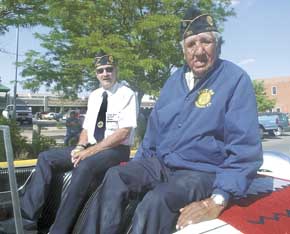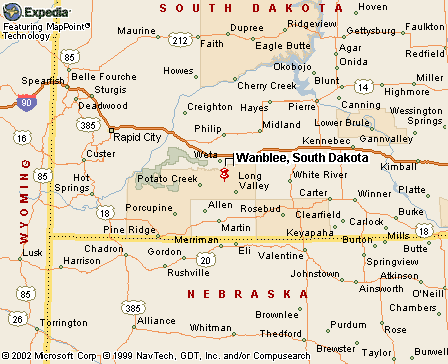|
|
Canku Ota |
|
|
(Many Paths) |
||
|
An Online Newsletter Celebrating Native America |
||
|
June 29, 2002 - Issue 64 |
||
|
|
||
|
Oglala Code Talker Last Link to History |
||
|
by Heidi Bell Gease, Rapid
City Journal Staff Writer
|
||
|
credits:World War
II Lakota code talker Clarence Wolf Guts acknowledges the applause of
the crowd as he rides in the American Legion Convention Parade in Rapid
City. (Journal photo by Dick Kettlewell)
|
 WANBLEE
-- Since 1968, the world has known that American Indian code talkers helped
Allied forces win World War II by transmitting strategic military messages
in their native languages. WANBLEE
-- Since 1968, the world has known that American Indian code talkers helped
Allied forces win World War II by transmitting strategic military messages
in their native languages.
But 30 years later, many people still believe all code talkers were Navajo. They have been honored with congressional medals, and they're the focus of a new movie, "Windtalkers," released last Friday. But 11 Lakota, Dakota and Nakota Indians from South Dakota were code talkers, too. One of them, Clarence Wolf Guts of Wanblee, may be the last surviving Oglala Lakota code talker. Wolf Guts grew up at Wanblee. He attended Catholic school but spoke Lakota at home. On June 17, 1942, at age 18, he enlisted in the U.S. Army. "I thought I wasn't going to pass the examination," he said, because he had a perforated eardrum. "But I guess I was wrong." His friend and cousin, Iver Crow Eagle Sr., enlisted at the same time. During Ranger training, an officer asked if they spoke "Indian." Both could speak, read and write Lakota. "He said, ‘Oh boy, I hit the jackpot,'" Wolf Guts recalled, smiling at the memory. After years of being discouraged and even punished for speaking native languages, Indian soldiers such as Wolf Guts used those languages to send messages the Japanese were never able to interpret. Wolf Guts traveled with a general in the Pacific, and Crow Eagle was radio operator for a colonel. "(The general) said, ‘What I want you to do is confuse the enemy as much as you can,'" Wolf Guts said. "They were smart, but we had to be a little bit smarter." Lakota code talkers created a phonetic alphabet, using it to send coded messages even their own families would not have understood. Only other code talkers understood the messages. Wolf Guts described war as "hell." "When I was in that foxhole, I prayed for all I was worth," he said. "The bullets flying all over ... I wanted to come home to the United States and be with my people, the people of America. ... I did what I could to possibly shorten the war." Pfc. Wolf Guts was honorably discharged on Jan. 13, 1946, but the war's demons followed him home. "When I was in the service, we drank quite a bit," he said. "It's easier that way to take another man's life." His battle with alcohol continued, but he now describes himself as a "former drinker." Today, he lives with his son, Coke Doyle, a tribal police officer. Now 78, Wolf Guts is a humble man. After the war, he rarely spoke of his days as a code talker. When he did, he thanked God for bringing him home. But things have a way of catching up. Wolf Guts and other veterans received honorary degrees from Oglala Lakota College last year. He rode in the American Legion parade last weekend in Rapid City. An acquaintance stopped him recently, saying, "Clarence, you're one of the code talkers. ... I want to shake your hand." After that, Wolf Guts said, "Everybody wanted to shake my hand." Politicians want to shake his hand, too. Sen. Tim Johnson, D-S.D., introduced a bill that could pass the Senate this week, honoring all Indian code talkers. Rep. John Thune, R-S.D., has introduced legislation in the House calling for Sioux Code Talkers to receive the Congressional Gold Medal. "I'll accept that all right, but I'm no hero," Wolf Guts said. "I done my part as a soldier. That's it."
|
|
|
||
|
|
||
| Canku Ota is a free Newsletter celebrating Native America, its traditions and accomplishments . We do not provide subscriber or visitor names to anyone. Some articles presented in Canku Ota may contain copyright material. We have received appropriate permissions for republishing any articles. Material appearing here is distributed without profit or monetary gain to those who have expressed an interest. This is in accordance with Title 17 U.S.C. section 107. | ||
|
Canku Ota is a copyright © 2000, 2001, 2002 of Vicki Lockard and Paul Barry. |
||
 |
 |
|
|
The "Canku Ota - A Newsletter Celebrating Native America" web site and its design is the |
||
|
Copyright © 1999, 2000, 2001, 2002 of Paul C. Barry. |
||
|
All Rights Reserved. |
||
